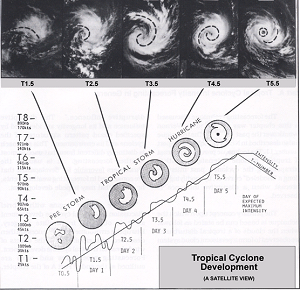Determining the intensity can be a challenging part of the forecasting process. There are now a number of different inputs that should be considered. Historically the Dvorak technique has been the primary input and is a required skill for any TC forecaster in a Tropical Cyclone Warning Centre. Although the method has existed for decades and there are other emerging technologies, it remains a robust technique to determine the intensity of a cyclone. The consistent application of the technique is an ongoing challenge for forecasters as there are many subtleties.
This is a series of short exercises to determine the intensity including the Dvorak technique. Each exercise is designed to be completed in about 30 minutes to allow them to be completed in the workplace at your convenience.
Each case will contain relevant satellite images, the previous Dvorak analysis and any other required information.
After completing your analysis, you can compare them with the suggested answers.
Each exercise has a follow-up component requiring interpretation of surface observations, Ascat, ADT/AMSU/SATCON, microwave imagery and previous policy to determine a final maximum wind speed.
If you have trouble at any stage refer to the Dvorak module or other training material available at:
TC Analysis Training Resources on Latitude

| Method: |
Online exercises. |
| Duration: | Four exercises of 30-45 minutes each, longer if training resources are required to be consulted. The exercises are independent of each other allowing completion to be done over time. |
| Assessment: | For each exercise you will be asked to complete and upload a Dvorak xls spreadsheet, enter in your estimated wind speed intensity and rationale and complete self-assessments. Reasonable answers are required for each exercise. |
| Help: | Contact Joe Courtney or your local TC expert(s). |
- Teacher: Pete Clegg
- Teacher: Joe Courtney
This course applies to the BMKG Indonesia Tropical Cyclone course in September 2018.
The workshop will include presentations and practical exercises aimed at BMKG forecasters.
The TC material will be aimed at forecasters involved in tropical cyclone services at an inexperienced to moderate level of experience.
- Teacher: Pete Clegg
- Teacher: Joe Courtney
This course applies to the WMO Tropical Cyclone workshop held every two years. The 2019 course is scheduled for Fiji 9-13 September.
The workshop will include presentations and practical exercises aimed at forecasters in the southern Pacific and Indian Oceans.
The TC material will be aimed at forecasters involved in tropical cyclone services at an inexperienced to moderate level of experience.
- Teacher: Pete Clegg
- Teacher: Joe Courtney
